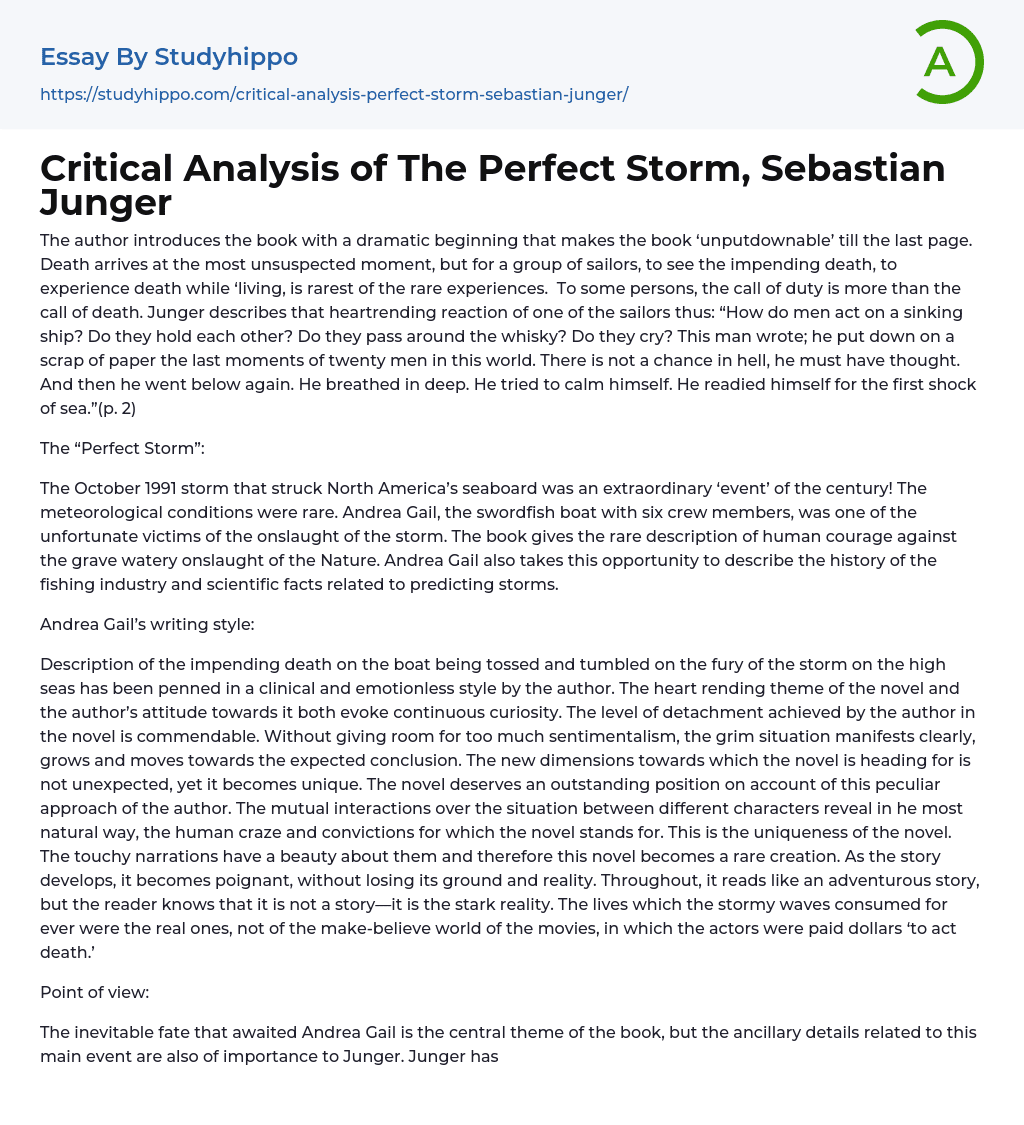

Critical Analysis of The Perfect Storm, Sebastian Junger Essay Example
The author starts the book with an engaging beginning that captivates readers and keeps them hooked until the end. Death comes unexpectedly, but for a group of sailors, witnessing death while still alive is an extremely rare experience. Some people prioritize their duty over their own lives. Junger describes the emotional response of one sailor in particular: "How do men act on a sinking ship? Do they support each other? Do they share whisky? Do they cry?" This man documented the last moments of twenty men on a scrap of paper, fully aware that there was no chance of survival. Afterward, he went back below deck, taking deep breaths and trying to calm himself in preparation for the impending impact of the sea (p. 2).
The "Perfect Storm":
The storm that hit North America's eastern coast in October 1991 was an unpreceden
...ted event of the century! The meteorological conditions were exceptional. Sadly, the Andrea Gail, a swordfish boat with a crew of six, fell victim to the fierce power of the storm. The book offers a unique account of human bravery in the face of the overwhelming force of nature at sea. Additionally, Andrea Gail takes this opportunity to delve into the history of the fishing industry and scientific facts regarding storm prediction.
Andrea Gail’s writing style depicts the impending death on the boat, as it is tossed and tumbled on the fury of the storm on the high seas, in a clinical and emotionless manner. Both the heartrending theme of the novel and the author’s attitude towards it spark continuous curiosity. The author's commendable level of detachment allows for a clear manifestation, growth, and progression of th
grim situation towards the expected conclusion. Although the new dimensions the novel evolves towards are not unexpected, they make it truly unique. This peculiar approach of the author warrants an outstanding position for the novel. The natural interactions between different characters reveal the human craze and convictions that the novel stands for. This is what sets the novel apart. The touchy narrations hold a certain beauty and make this novel a rare creation. As the story develops, it becomes increasingly poignant while remaining grounded in reality. Throughout, it reads like an adventurous story, but the reader is aware that it is not mere fiction—it represents stark reality.The lives lost in the storm were real, unlike the fictional world of movies where actors are paid to pretend to die. The main focus of the book is the inevitable fate of the Andrea Gail, but the additional details surrounding this event are also important to Junger. He portrays the bravery and determination of the men facing the tragic storm. Junger provides vivid descriptions of those who rely on the fishing industry to make a living, highlighting what it means for those who face the challenges of the sea daily. Andrew Gail was a part of this industry. The book also delves into scientific explanations of marine behavior and tidal patterns. The sea was merciless to those involved in the rescue efforts. While their goal was to save lives, they constantly faced the possibility of death in their desperate struggle. Junger presents factual accounts in this book, without creating imaginary heroes or villains. He shows how ordinary men can gain extraordinary courage in extraordinary situations. The situation for
the men on the fishing boat was dire as they sought swordfish near Georges Bank at the end of the season. The individuals involved in this tragedy included Captain Billy Tyne and five other Gloucester fishermen.They were caught in the combination of three major storms. Junger briefly mentions the maritime history of Gloucester, emphasizing the shocking fact that since the fishing industry began, 1650 men have perished. This sets the stage for the tragic story to follow. In order to provide a realistic assessment of the fishing industry, Junger stayed in Gloucester and conducted his research. The impact of the storm was so severe that three members of the Coast Guard nearly lost their lives. Every attempt at rescue was thwarted by waves over one hundred feet high. The storm appeared suddenly without any warning. Captain Billy Tyne of the Andrea Gail radioed, "She's comin' on, boys, and she's comin' on strong," off the coast of Nova Scotia, and shortly after that, the boat and its crew of six vanished without a trace. Even long after reading the book, it remains impossible to forget the various characters involved in the novel: the Captain and his crew, the Coast Guard rescuers, and the unsettling uncertainty about Andrea Gail's final resting place. The tragedy marked the end of a profitable trade. The colossal waves danced around the boat, making any attempt at return or aid impossible. It seemed that nature's message to these six individuals was, "Your work is done and you have completed your journey on the sea."
- Animals essays
- Charles Darwin essays
- Agriculture essays
- Archaeology essays
- Moon essays
- Space Exploration essays
- Sun essays
- Universe essays
- Birds essays
- Horse essays
- Bear essays
- Butterfly essays
- Cat essays
- Dolphin essays
- Monkey essays
- Tiger essays
- Whale essays
- Lion essays
- Elephant essays
- Mythology essays
- Time Travel essays
- Discovery essays
- Thomas Edison essays
- Linguistics essays
- Journal essays
- Chemistry essays
- Biology essays
- Physics essays
- Seismology essays
- Reaction Rate essays
- Roman Numerals essays
- Scientific Method essays
- Mineralogy essays
- Plate Tectonics essays
- Logic essays
- Genetics essays
- Albert einstein essays
- Stars essays
- Venus essays
- Mars essays
- Evolution essays
- Human Evolution essays
- Noam Chomsky essays
- Methodology essays
- Eli Whitney essays
- Fish essays
- Dinosaur essays
- Isaac Newton essays
- Progress essays
- Scientist essays



